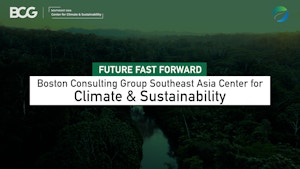#sustainable development Berita

Bandar-bandar
Stay or go? Jakarta’s coastal communities mull adaptation or migration as the city sinks
As Indonesia's capital is slowly claimed by the Java Sea, thousands of people are losing their homes and are increasingly vulnerable to disease and fresh water scarcity.

Bandar-bandar
Tighten legal ambiguity, protect more forests: Singapore conservationists issue wishlist to government
Key asks include looking into having two new nature parks, along with explicit safeguards for the airspace above and earth under protected areas – after an upcoming subway line was allowed to run under gazetted forests years ago.

The Brazilian city of Belém will welcome the world at next year’s UN climate summit, but faces a race to be ready. Its residents are calling for a lasting legacy and investment.

The sustainability-focused publication came up tops among competitors in the small and medium media category for 'Best Newsletter' at the awards ceremony held in Kuala Lumpur, Malaysia.
Karbon & Cuaca
Why does the EU want to quit the Energy Charter Treaty?
#sustainable development Pendapat

Polisi & Kewangan
What a climate-aligned IMF would look like
As the only multilateral institution charged with maintaining global financial and fiscal stability, the IMF’s role is critical for addressing climate change.

Polisi & Kewangan
The World Bank and IMF must put a value on clean air
Air pollution is a 'silent killer', say former New Zealand PM and former WHO chief scientist.

Polisi & Kewangan
Degrowth is a dead end
The degrowth movement lacks a coherent theory of change and its goals are politically impractical. Degrowth might actually harm climate policy.

Sisa Kumbahan
Reducing plastic pollution requires local remedies
The new global treaty to end plastic pollution should consider support for on-the-ground initiatives that remove and recycle waste. A disconnect between international plans and local realities can thwart progress and breed cynicism.
Karbon & Cuaca
Young voters care about climate change. Politicians don't.
Polisi & Kewangan
Harmonising global green taxonomies cannot come soon enough
#sustainable development Video

Polisi & Kewangan
Tackling climate change in a mosaicked Asia
Studio EB
Asia's green transition pathways need to be socially inclusive given huge differences in economic development across the region, says experts at the Boston Consulting Group. State-owned enterprises have an "outsized" role to play, they add.

Gaurav Sant, founder of startup SeaChange, tells Eco-Business about a technology he hopes will give the world's oceans the capacity to absorb additional carbon dioxide from the atmosphere.

Karbon & Cuaca
Climate spiral: what 141 years of global warming looks like
As planetary temperatures reach an all-time high, a climate scientist has designed a new way to show how global temperatures have changed every month since the start of the industrial revolution and 2021.

Makanan & Pertanian
Singaporeans love food, but are they valuing food enough?
Studio EB
Singaporeans are well-known foodies, but around 800,000 tonnes of food is wasted every year. Why is so much food wasted, and what can consumers do about it?
#sustainable development Audio

Bangunan Hijau
‘Sustainability must be accessible’: Arthaland’s CSO on making sustainable real estate in the Philippines a norm
Studio EB
If a real estate development can reduce energy and water consumption – and emit fewer carbon emissions – it is built to last, Oliver Chan tells the Eco-Business podcast. The key, however, is to first educate future homeowners and businesses that going green does not mean breaking the bank.

Karbon & Cuaca
Seeing through the haze – is palm oil still to blame?
Studio EB
Transboundary haze pollution is back with a vengeance in Southeast Asia. The Eco-Business Podcast talks to RSPO CEO Joseph D'Cruz about what the palm oil sector can do to put out the peatland fires that have burned annually for four decades.

Polisi & Kewangan
‘Never give in to fear’: Nobel peace prize nominee and Filipino Indigenous leader Vicky Tauli Corpuz
In celebration of Indigenous Peoples' month in the Philippines, the former United Nations special rapporteur tells the Eco-Business Podcast about her lifelong work to empower communities in Asia’s most dangerous country for environmental defenders.

Polisi & Kewangan
‘We do not just adopt global standards, we respond to domestic challenges’: Philippine central bank exec Lyn Javier
The Bangko Sentral ng Pilipinas assistant governor tells the Eco-Business Podcast about the regulator’s maiden sustainability report that features an empirical study of climate impacts on banks as well as the nation’s first taxonomy.
#sustainable development Siaran Akhbar

United Nations Economic and Social Commission for Asia and the Pacific (ESCAP)
Countries resolve to leverage innovation, promote digital inclusion for those furthest behind

Volvo Construction Equipment Asia
Why electric construction machines should play a key role in bringing Singapore’s Green Plan to life

United Nations Development Programme
Korea, UNDP and Extreme Tech Challenge launch tech startup competition to drive SDG 16 solutions
#sustainable development Penyelidikan

Eco-Business, supported by Boehringer Ingelheim
Moving towards a rabies-free Southeast Asia

Eco-Business & Regional Project Energy Security and Climate Change Asia-Pacific of the KAS
Ocean of Solutions: Protecting biodiversity in the blue economy

SolAbility
Laos leads the Natural Capital Index 2021

Asia Research and Engagement
Seafood sourcing risks in Asia















